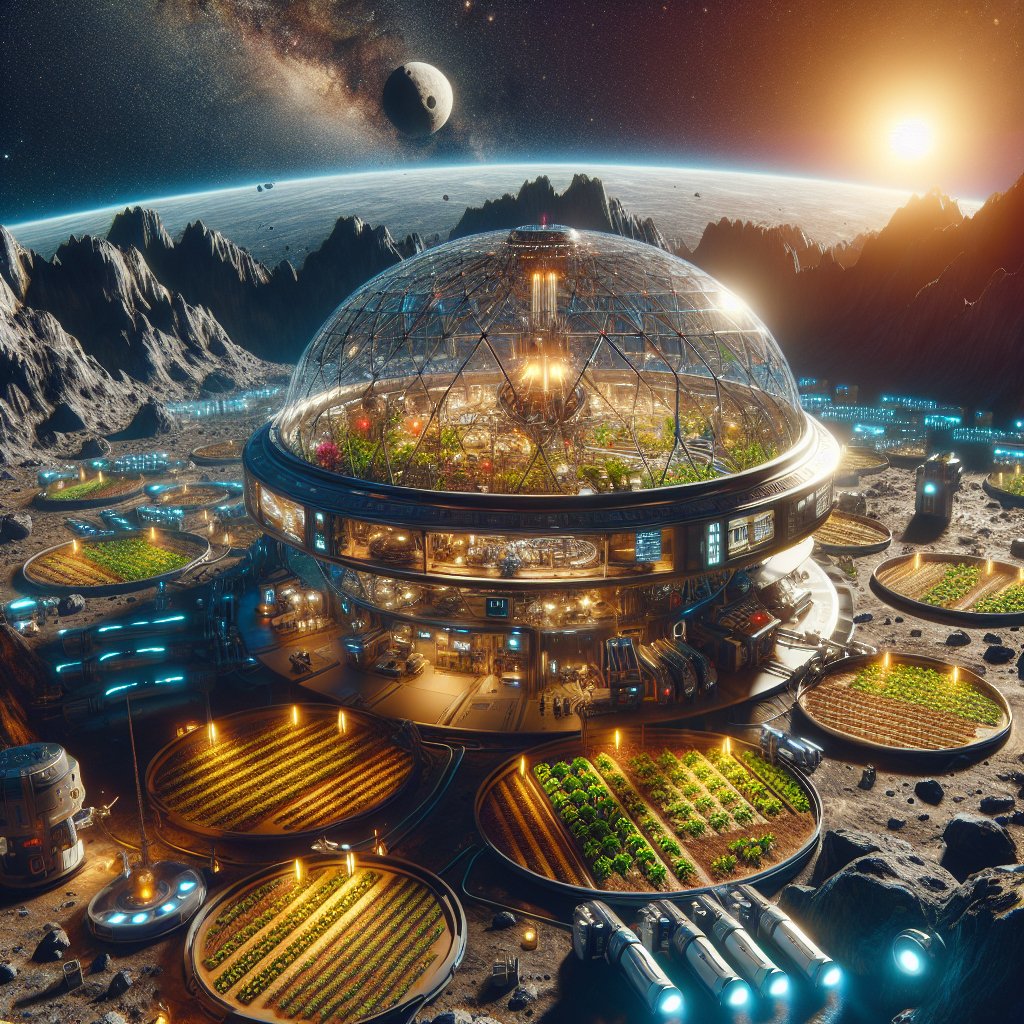The future of farming in asteroid mining colonies presents a fascinating intersection of agriculture and space exploration. As humanity looks beyond Earth for resources, the potential for establishing sustainable agricultural practices in extraterrestrial environments becomes increasingly relevant. This article explores the challenges and opportunities of farming in asteroid mining colonies, examining innovative techniques, the role of technology, and the implications for food security in space.
Challenges of Farming in Asteroid Mining Colonies
Establishing agricultural systems in asteroid mining colonies is fraught with challenges that stem from the unique conditions of space. These challenges can be categorized into several key areas:
1. Environmental Conditions
Asteroids present a harsh environment for farming. The lack of atmosphere means that there is no protection from cosmic radiation, which can be detrimental to plant growth. Additionally, microgravity affects plant physiology, leading to altered growth patterns and nutrient uptake. The absence of soil also poses a significant challenge, as traditional farming methods cannot be applied.
2. Resource Availability
Water, nutrients, and energy are essential for farming, yet these resources may be scarce or difficult to obtain in asteroid mining colonies. While some asteroids contain water ice, extracting and purifying it for agricultural use requires advanced technology. Similarly, the availability of nutrients must be carefully managed, as transporting fertilizers from Earth is not feasible for long-term sustainability.
3. Technological Limitations
Current agricultural technologies are primarily designed for Earth’s conditions. Adapting these technologies for use in space will require significant innovation. Hydroponics and aeroponics are promising methods that could be employed, but they need to be modified to function effectively in microgravity and with limited resources.
Innovative Solutions for Space Agriculture
Despite the challenges, there are numerous innovative solutions being explored to enable farming in asteroid mining colonies. These solutions leverage advancements in technology and our understanding of plant biology.
1. Closed-Loop Systems
Closed-loop agricultural systems are designed to recycle resources, minimizing waste and maximizing efficiency. In a closed-loop system, water is continuously cycled through the system, and nutrients are reused, reducing the need for external inputs. This approach is particularly beneficial in space, where resupplying resources from Earth is costly and impractical.
2. Genetic Engineering
Genetic engineering holds great promise for developing crops that can thrive in the harsh conditions of space. By modifying plants to enhance their resilience to radiation, microgravity, and nutrient deficiencies, scientists can create varieties that are better suited for extraterrestrial farming. Research into extremophiles—organisms that thrive in extreme environments—can also provide insights into how to cultivate crops in space.
3. Vertical Farming and Modular Systems
Vertical farming techniques can maximize space utilization in asteroid colonies, allowing for more efficient production of food. Modular farming systems can be designed to be easily transportable and adaptable to different environments, making them ideal for use in mining colonies. These systems can be integrated with mining operations, utilizing waste heat and other byproducts to support agricultural activities.
The Role of Technology in Space Agriculture
Technology will play a crucial role in the success of farming in asteroid mining colonies. Several key technological advancements are being explored:
1. Automation and Robotics
Automation and robotics can significantly enhance agricultural productivity in space. Automated systems can monitor plant health, manage nutrient delivery, and optimize growing conditions without the need for constant human intervention. Drones and robotic systems can also be employed for planting, harvesting, and maintenance tasks, reducing labor requirements and increasing efficiency.
2. Artificial Intelligence and Data Analytics
Artificial intelligence (AI) can be utilized to analyze data from agricultural systems, enabling real-time decision-making and optimization of growing conditions. Machine learning algorithms can predict plant growth patterns, identify potential issues, and suggest interventions to improve yields. This data-driven approach can enhance the sustainability and productivity of space agriculture.
3. Bioregenerative Life Support Systems
Bioregenerative life support systems integrate biological processes with technological systems to create a self-sustaining environment. These systems can produce food, recycle waste, and generate oxygen, making them ideal for long-term habitation in space. By incorporating agriculture into life support systems, asteroid mining colonies can achieve greater self-sufficiency and resilience.
Implications for Food Security in Space
The establishment of farming in asteroid mining colonies has significant implications for food security in space. As humanity ventures further into the cosmos, ensuring a reliable food supply will be essential for the success of long-term missions and colonization efforts.
1. Supporting Human Exploration
Farming in space can support human exploration by providing fresh food for astronauts on long-duration missions. This not only enhances the nutritional quality of their diet but also contributes to their psychological well-being. Access to fresh produce can improve morale and reduce the monotony of space travel.
2. Enabling Sustainable Colonization
For successful colonization of other celestial bodies, sustainable agricultural practices will be necessary. Farming in asteroid mining colonies can serve as a model for future settlements on Mars or the Moon, where similar challenges will arise. Developing effective agricultural systems in space will be crucial for establishing self-sufficient communities beyond Earth.
3. Advancing Earth-Based Agriculture
Innovations developed for space agriculture can also have applications on Earth. Techniques such as closed-loop systems, vertical farming, and advanced monitoring technologies can improve agricultural practices and sustainability on our home planet. The challenges faced in space can drive advancements that benefit food production and security on Earth.
Conclusion
The future of farming in asteroid mining colonies is a promising frontier that combines the fields of agriculture and space exploration. While challenges abound, innovative solutions and technological advancements offer pathways to sustainable agricultural practices in extraterrestrial environments. As humanity continues to explore the cosmos, the development of effective farming systems will be essential for ensuring food security and supporting long-term habitation beyond Earth. The lessons learned from space agriculture may also pave the way for a more sustainable future for farming on our home planet.




